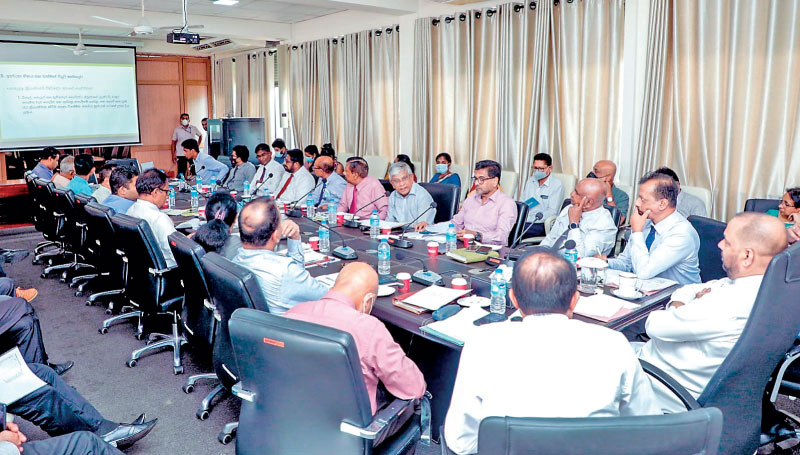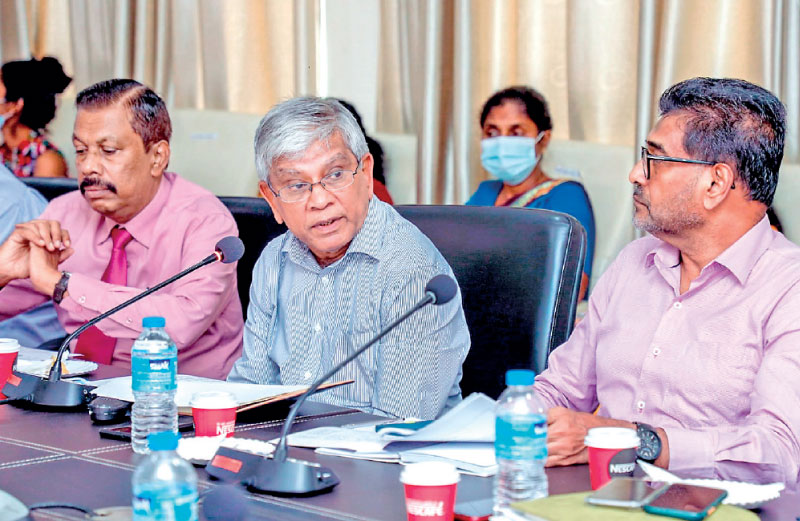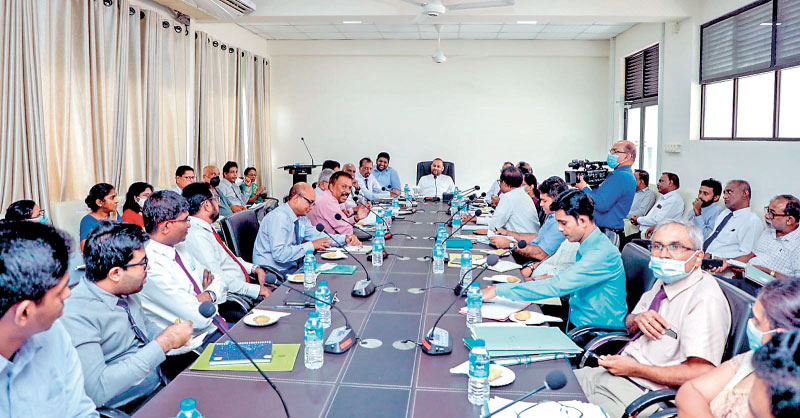Monday Feb 23, 2026
Monday Feb 23, 2026
Monday, 26 September 2022 02:46 - - {{hitsCtrl.values.hits}}

The Sri Lanka Agripreneurs’ Forum (SLAF) has announced a 10-point proposal to sustainably overcome the current and future food crisis in the country.
SLAF is the single professional agri-entrepreneurial organisation that represents approximately 30% of the country’s workforce and the move is in recognition of the dire need to positively intervene in the current food crisis in the country.
It met with Agriculture Minister Mahinda Amaraweera last month to discuss sustainable solutions. Following this, a meeting was arranged, facilitated by SLAF on 6 September 2022 with the participation of the heads of respective state agencies such as the Ministry of Agriculture, Colombo Municipal Council, Sri Lanka Standards Institution, National Fertiliser Secretariat and Institute of Postharvest Technology.
Heads of the private sector were also present at the meeting such as Hayleys, Lankem, CIC, Unipower, CropLife, and Baurs. The discussion was led by key Executive Council members of the SLAF bringing in a 10-point proposal to the table.
SLAF pointed out that the shortage of inorganic fertiliser, organic fertiliser, agro chemicals, vegetable seeds and most of the other Agri inputs in the last Maha (21/22) and Yala 2022 made a considerable impact on the food production of the country and it may have a greater impact even in coming Maha season 22/23 due to shortage of fuel, forex, all Agri inputs and the less than ideal economic situation in the country.
It was highlighted to the Minister that this is the largest contraction in the agricultural economy recorded since 2015 and pointed out that if the problems are not addressed by the authorities immediately, the food crisis situation could be worse during the early part of 2023.
SLAF listed the key limitations the country is facing now, because of the economic crisis in the country and strongly recommended the way forward given below to achieve food availability (mainly, locally grown) accessibility while being affordable to ensure the sustenance of the nation.
The specific issues along with the solutions include;
Shortage of fuel and current power cuts
This has a direct impact on cultivation-focused activities and transportation of harvest to the markets. As a result, at least 30% of paddy and vegetable farmers have kept away from cultivation and this attitude will be continued even for Maha season 22/23 if immediate solutions are not given. This situation also applies to the livestock sector quite severely.
To address this issue Diesel, Petrol, and Kerosene oil should be given to farmers under a prioritised quota system to operate agri machinery and other modes of transportation (tractors, water pumps weeding and harvesting machines, and lorries and trucks) through a permit system introduced by AGAS of the area.
Restrictions on ‘forex’ approvals given by Central Bank to commercial banks to import a total range of Agri inputs
As a result, a shortage of imported hybrid seeds, synthetic fertilisers, and other Agri inputs has occurred. Imported seeds available in the market are only 10% of the national requirement and we have further noticed a severe shortage of local seed varieties. Due to shortages of major Agri inputs, such as seeds, fertilisers, agrochemicals, Agri machinery, and overall inputs, approximately 30% of disappointed farmers are keeping away from cultivations. 30 – 40% drop in yield in cultivated lands is not supporting the current situation positively.
As a solution, SLAF proposed to lift the TT limit of $ 50,000 for the importation of Agri inputs, up to $ 100,000 at least until 31.03.2022. It was also recommended that the Central Bank give directions to Commercial Banks to treat Agri input imports such as fertiliser, agrochemicals, and seeds as essential imports when issuing letters of credit (LCs) or TT payments.
Impact on the livestock sector
The livestock industry has been affected badly due to almost ‘0’ production of ‘Maize’ required for animal feed production. Maize seed imports have come to a halt due to the non-availability of forex. The limited acreage cultivated cannot contribute sufficiently to achieve the expected Maize harvest due to the non-availability of synthetic fertilisers and agrochemicals and it was noticed that yield dropped by 50%-60%.
As a result, consumers today have to pay today Rs. 1300.00 per Kg for chicken and the price of an egg is in the range of Rs. 50.00 – 60.00. Similarly, the price of liquid milk too has gone up drastically. Apart from the affordability, the availability of these products is becoming irregular.
SLAF recommended allowing hybrid Maize seed imports and providing required forex for the seed industry to address this issue. It was also suggested to encourage farmers to grow ‘Maize’ in the coming Maha season and the Government should offer incentives for Maize farmers based on their yields.
It was recommended to ban the import of Maize for the animal feed industry as a means of saving forex, subject to the expected yield of Maha cultivation. SLAF also highlighted that the recent proposal to register Maize cultivation farmers should also have a follow-up to support their cultivation with necessary inputs and assured markets and prices.
Identify the values and benefits of the second and third-generation plant nutrients -
According to National Fertiliser Secretariat (NFS) records, Sri Lanka imports 750,000 – 800,000 MT of chemical fertilisers spending almost $ 400 million per annum. This volume includes approximately 300,000 MT of Urea and it has only a single nutrient component, that is Nitrogen.
Recently, the price of 01 MT Urea went up to $ 1100 in April 2022 and today it is in the range of $ 500-700 per MT in the international market. Even if we take the average price of $ 800 per MT, Sri Lanka must forecast to spend $ 240 million only for the import of Urea for the Maha season.
According to international and local research institutions, 65%-70% of the nutrient value is lost and wasted when applying Urea to a crop. In Sri Lanka, Urea is mainly used for addy cultivation in the early stages.
As a solution, SLAF recommended the Government should give due recommendations to NPK + TE (trace elements) mixed compound fertilisers with advanced fertilisers as it reduces the wastage while also reducing the amount of required fertiliser by 40% - 50%.
SLAF further recommends introducing ‘Hybrid fertilisers’ produced with 60% chemical and 40% organic fertilisers with different NPK ratios based on crop requirements. SLAF also urged the authorities to encourage farmers to use slow-release and controlled-release fertilisers for their inherent benefits. It was highlighted that the Government should not consider giving fertilisers under the subsidy schemes anymore and should discourage using Urea for other field crops.
SLAF pointed out that the proposal by the Minster that 30% organic fertiliser should be used for the next Maha season needs to be formalised and followed up with the supply of commercially certified organic fertilisers being registered and made known. The administrative mechanisms to ensure the achievement of this goal should be in place without delay.
Lack of focus on the plantation and export agriculture sector
Records indicated that the production and export of Tea have come down drastically. Export earnings from Tea exports only record $ 1.9 billion in 2018/2019 and the values have come down in 2021/2022 to approximately 1.2 billion mainly due to the ban of Weedicides and the non-availability of chemical fertilisers. The same facts are applying to other export agriculture crops such as cinnamon, pepper, spices and betel, etc.
SLAF recommended allowing the import of weedicides such as ‘Glyphosate’ even in limited quantities and making available forex to import proper fertiliser mixtures of all export-oriented crops including plantation crops. It was suggested to encourage farmers to produce export-oriented crops and offer them incentives based on their contribution to harvest. Introducing the use of Biofertilisers and Biopesticides to gain recognition in the international market for organic produce and support local producers of such products. It was pointed out to ensure the necessary regulations and administrative procedures to recognise the optimal products and aggressively support the development of such products.
SLAF remarked that Improving value addition on product quality and post-harvest processing technology targeting the high-value export markets is another timely requirement of the Sri Lankan agricultural sector to earn better export earnings.
The discussion with the respective stakeholders saw the concerns of both the private and public sectors being brought to light and the respective authorities being tasked with implementing the solutions which were agreed upon.
The SLAF strongly believes that a pragmatic approach to revolutionising the Sri Lankan agricultural sector is crucial to uplift the current status of the country and its people. Thus, it is firmly agreed to bring about this change by being a key facilitator in coordinating between the Government sector, private sector, and individual farmers. SLAF identifies that this is only possible through genuine commitment and devotion to the well-being of the country and its people.
SLAF calls upon dedicated individuals and companies/institutions to support the cause of the SLAF and to provide their support on creating a better nation through the improvement of agriculture.
Contact us via our email at [email protected] to extend your willingness to contribute and be a part of the SLAF membership.
Finally, the SLAF takes this opportunity to call on the authorities to implement the proactive measures provided by the State and private sectors and to continue working towards the good and well-being of the people of this country to ensure a better tomorrow for all of us.
The full 10-point proposal of SLAF is available online at www.agripreneur.lk

